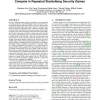Free Online Productivity Tools
i2Speak
i2Symbol
i2OCR
iTex2Img
iWeb2Print
iWeb2Shot
i2Type
iPdf2Split
iPdf2Merge
i2Bopomofo
i2Arabic
i2Style
i2Image
i2PDF
iLatex2Rtf
Sci2ools
76
Voted
ATAL
2015
Springer
2015
Springer
"A Game of Thrones": When Human Behavior Models Compete in Repeated Stackelberg Security Games
Several competing human behavior models have been proposed to model and protect against boundedly rational adversaries in repeated Stackelberg security games (SSGs). However, these existing models fail to address three main issues which are extremely detrimental to defender performance. First, while they attempt to learn adversary behavior models from adversaries’ past actions (“attacks on targets”), they fail to take into account adversaries’ future adaptation based on successes or failures of these past actions. Second, they assume that sufficient data in the initial rounds will lead to a reliable model of the adversary. However, our analysis reveals that the issue is not the amount of data, but that there just is not enough of the attack surface exposed to the adversary to learn a reliable model. Third, current leading approaches have failed to include probability weighting functions, even though it is well known that human beings’ weighting of probability is typically n...
| Added | 16 Apr 2016 |
| Updated | 16 Apr 2016 |
| Type | Journal |
| Year | 2015 |
| Where | ATAL |
| Authors | Debarun Kar, Fei Fang, Francesco Maria Delle Fave, Nicole Sintov, Milind Tambe |
Comments (0)

